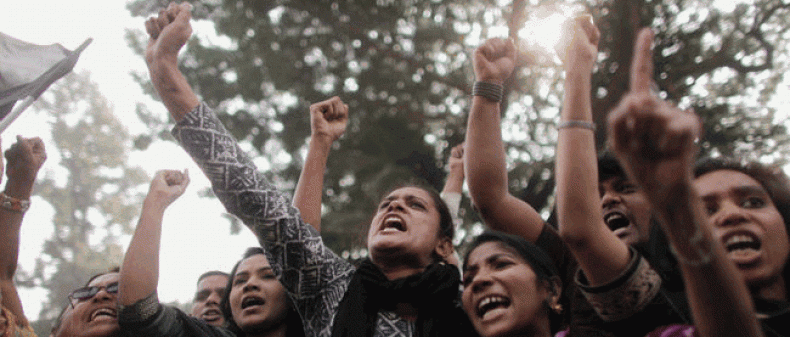
Check the label on your shirt. There’s a good chance that it reads “Made in Bangladesh.” Only China, a country with eight times as many people, exports more clothing. Garment production for foreign companies is an $18 billion industry for the South Asian country, but keeping up with international demand means low wages and lax safety measures.
Although none of this is new, the lives of Bangladesh’s garment workers were brought to international attention this week when a fire at the Tazreen Fashion factory just outside of Dhaka killed at least 111 people, with many more suffering from burns and smoke inhalation. The fire began on Saturday in the yarn storage room on the ground floor, but quickly spread upwards. The factory made T-shirts, polo shirts and fleece jackets for companies like C&A, Walmart’s ironically-named label “Faded Glory,” and Sean P. Diddy Comb’s clothing line. Of the 1,500 employed at the factory, most had gone home for the day. The 600 who remained were working overtime.
The problem was not only that there weren’t enough exits, but that some were locked. Three managers have been arrested for padlocking the doors. “One factory worker broke a window and one of the workers pulled me through,” said survivor Parul Begum. “After the fire, we tried to run out the door, but it was locked. When the floor (became) dark with smoke, the boys came to rescue me.” A Police official told AFP News Agency that the managers tried to keep workers in the burning building by telling them it was a only a fire drill.
The New York Times quoted another survivor, 22-year old Mohammad Raju, who escaped by climbing down bamboo scaffolding: “It was crowded on the stairs as all the workers were trying to come out from the factory. There was no power supply; it was dark, and I lost my mother in dark. I tried to search for her for 10 to 15 minutes, but did not find her.”
The cause of the fire is still unknown, although fire fighters have said an electrical fault or a dropped cigarette could easily be to blame. It’s telling that Bangladesh’s government officials have focused what started the fire rather than on safety measures and reforming the industry.
Interior Minister Mohiuddin Khan Alamgir believes arsonists are to blame, saying, “We are determined that these saboteurs are brought to book. At the same time we would like to assure everyone here and abroad that our production process will continue with no limitations. No obstacles will be allowed to stand in its way.”
Meanwhile, the owner of the factory is missing in action.
I’m not the only one who was reminded of the Triangle Shirtwaist Factory fire in 1911. The tragedy in New York’s Greenwich Village killed 146 garment workers, becoming the second deadliest event in the city’s history until September 11th, 2001. Most of the victims were Italian and Jewish immigrant women.
The managers had locked the doors to the stairways and exits to prevent stealing and cigarette breaks. As a result, many workers jumped out of 9th and 10th floor windows, falling to their deaths on the city streets below. The tragedy, whose youngest victim was an 11-year old girl, shocked observers and left an indelible mark on the industry. Stricter safety standards were enacted (making alarms and fire extinguishers mandatory), locked doors prohibited, and unionization grew. More than 100,000 people joined the funeral march for the victims.
That was a long time ago, when great urban centres like New York and Toronto actually manufactured things. The distance between the wealthy Vanderbilts and Astors on Park Avenue and the sweatshops in Greewich Village was more mental than geographic. Reformers could get upset that such a tragedy could happen in their city, under their noses.
In a globalized world, most of us have no idea where our clothing comes from, or the conditions that it was produced in. The mental gap between my very fortunate life and that of a factory worker in Bangladesh is matched by the great distance between spots on opposite sides of the globe. With players so large and formidable (countries, multinational corporations, the forces of international trade) the concerned individual can feel powerless. What can we do, other than try to stay informed and choose carefully where we shop?
There’s early evidence that the Tazreen Fashion fire could be Bangladesh’s Triangle Shirtwaist moment. For the third day, thousands of people in Dhaka have protested in the streets, vandalizing factories, blocking highways, setting fire to motorcyles, and throwing rocks at policemen. By Wednesday, many factories had declared a day of mourning out of fear of large-scale labour unrest.
Five hundred Bangladeshi factory workers have died in fires since 2006. It will take unparalleled dedication and cooperation from governments, factories, foreign companies, and unions to make the changes that Bangladesh needs, especially in a place where union leaders mysteriously disappear. The embers are finally put out at Tazreen. May they burn brightly in memory.
____
Max Mosher writes about style for Toronto Standard. You can follow him on Twitter at @max_mosher_.
For more, follow us on Twitter @TorontoStandard or subscribe to our newsletter.














